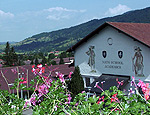Focus on NATO’s partnerships

Some 300 participants from 35 countries all around the world have gathered for a major two-day event, on 23 and 24 January, focused on NATO’s partnerships with non-member countries and other international organizations.

Some 300 participants from 35 countries all around the world have gathered for a major two-day event, on 23 and 24 January, focused on NATO’s partnerships with non-member countries and other international organizations.
The annual Partnership for Peace (PfP) Planning Symposium at the NATO School in Oberammergau, Germany, is a flagship event in NATO’s agenda. The event is aimed at generating ideas and takes place under the “Chatham House Rule”. This encourages free discussion by allowing people to speak as individuals and express views that may not be those of their organizations.
In the past, the event has been largely devoted to activities within the Euro-Atlantic Partnership framework.
This year, it will also focus on cooperation with countries participating in the Mediterranean Dialogue and the Istanbul Cooperation Initiative as well as relations with other non-member countries that have less formal relationships with NATO but share NATO’s values and contribute to NATO-led operations. Often referred to as “contact countries”, these include Australia, New Zealand, Japan and the Republic of Korea.
Cooperation with various international organizations will also come into the spotlight.
“We want to hear from our partners what we can improve in our relations with them,” says Ambassador Martin Erdmann, NATO Assistant Secretary General for Political Affairs and Security Policy, in a web interview. “This time, it is more us listening to them, than the other way around.”
On the first day, the plenary session will focus on progress being made in implementing the initiatives to strengthen NATO’s partnerships that were taken at NATO’s Riga Summit in November 2006.
Keynote speakers include the Finnish Foreign Ministry’s Undersecretary of State for Political Affairs, the Egyptian and Kuwaiti Ambassadors to Belgium, and a senior academic at the Japanese Institute for International Affairs.
Parallel working groups in the afternoon will look at partnerships from different angles: how to find common ground between Allies and Partners in terms of interests and goals; how to make better use of Partnership tools in cooperation with countries that do not participate in the Partnership for Peace; and lessons learned from cooperation with partners in the context of the NATO-led operation in Afghanistan.
The second day focuses on the future. The plenary session looks ahead to expectations and aspirations for the Bucharest Summit in April 2008 and NATO’s 60th anniversary summit in 2009.
Key note speakers include the Romanian Foreign Ministry’s Secretary of State for the organization of the 2008 Summit and a senior academic at the Royal Military Academy of the Netherlands.
The parallel working groups in the afternoon will look at what future course NATO’s partnership and cooperation policy should take; at the potential for cooperation with other international organizations; and at whether the experience of promoting stability through integration in the Western Balkans could be applied to other regions.